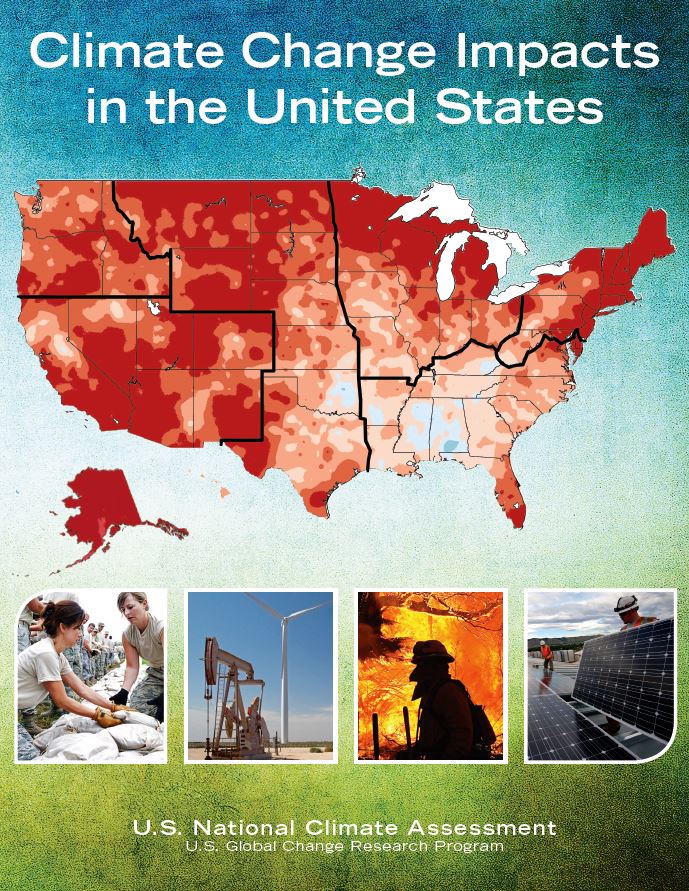“Climate change, once considered an issue for a distant future, has moved firmly into the present.”
Earlier today, the US Global Change Research Program released its third National Climate Assessment Report (NCA). Coming on the heals of the IPCC’s third and final segment of their Fifth Assessment Report, this represents the US Government’s most thorough climate change report to date. (Read our break down of IPCC Part One, and look for Parts Two & Three soon)
 Drafted by more than 300 experts and a 60-member Federal Advisory Committee, the NCA was extensively reviewed by the public and experts alike, including federal agencies and the National Academy of Sciences.
Drafted by more than 300 experts and a 60-member Federal Advisory Committee, the NCA was extensively reviewed by the public and experts alike, including federal agencies and the National Academy of Sciences.
The 800-plus-page omnibus examines effects on every region of the continental US, Alaska, and Hawaii, as well as impacts to oceans and water resources, energy supply, human health, transportation, urban infrastructure, rural communities, indigenous peoples, ecosystem health, and more. You can find the full report, and its highly interactive and engaging website here.
The National Climate Assessment concluded four key messages for the Northeast Region, which it defined as stretching from Washington DC to Maine (West Virginia too!):
- Heat waves, coastal flooding, and river flooding will pose a growing challenge to the region’s environmental, social, and economic systems. This will increase the vulnerability of the region’s residents, especially its most disadvantaged populations.
- Infrastructure will be increasingly compromised by climate-related hazards, including sea level rise, coastal flooding, and intense precipitation events.
- Agriculture, fisheries, and ecosystems will be increasingly compromised over the next century by climate change impacts. Farmers can explore new crop options, but these adaptations are not cost- or risk-free. Moreover, adaptive capacity, which varies throughout the region, could be overwhelmed by a changing climate.
- While a majority of states and a rapidly growing number of municipalities have begun to incorporate the risk of climate change into their planning activities, implementation of adaptation measures is still at early stages.
Specifically related to our work in Connecticut and on Long Island Sound, the NCA noted the following:
- Citing a recent study, the risk for contracting a stomach illness while swimming in our state is significantly increased after just one inch of precipitation. This means a potentially wetter and wilder climate could increase this human health problem. One way we work to address this is by advocating local and state leaders to invest in much-needed infrastructure repairs. The biggest culprits are failing sewer lines, some of which shockingly dump directly into the Sound during heavy rains. Many cities and towns are moving the right direction and we’re looking forward to expanding our efforts and successes.
- Some of our coastal communities are among the most at-risk for sea level rise in the New England. Whether its a major city like Stamford or picturesque beach town like Milford, we need better planning and better programs to help our most vulnerable residents, businesses, and infrastructure adapt and improve this future.
- Finally, the NCA commended Connecticut for developing climate adaptation plans , both at state and municipal levels, through strong leadership, comprehensive information & tools, and an effective decision-making process.
Climate change will be the defining problem of this century, and its impacts will be felt in each state and every industry. But the challenges it presents don’t have to viewed as such, but rather as opportunities. For leadership, for innovation, and for stewardship. The world around us is changing; its our job to make it the best we can.
Posted by Tyler Archer, Outreach & Development Associate for CFE & Save the Sound.

1 thought on “New National Report shows impacts of Climate Change spread across regions and industries”
Comments are closed.